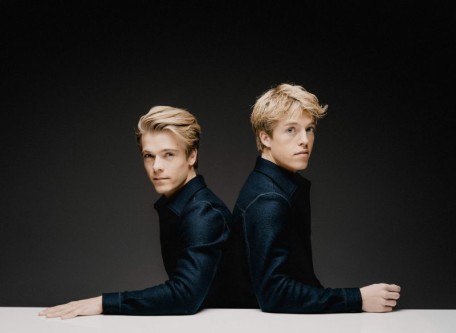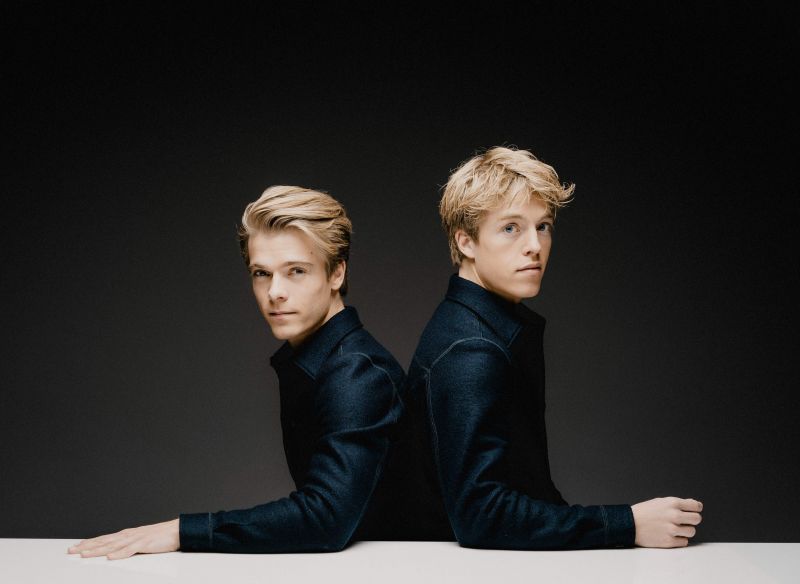
The one certainty of life is death, said a wit.
Moreover, the life death process is operative thousands of times a minute within all livings things –animal as well as vegetable. Understanding what humans have in common with a blade of grass is not without its charm, once you’ve got over the shock. But until the relatively recent advent of microbiology, Western medicine blithely operated in ignorance of this fundamental. Microbiology is, however, the very cornerstone of Eastern medical practice, and has been since before written records were kept, which is long before the year the presumed Noah went into the presumed ark.
And Schubert, unobserved by most of us, spent a lifetime exploring this phenomenon in music. The OED’s phenomenal says perceptible through the senses or through immediate experience. Schubert invokes both.
And perhaps nowhere quite so impressively as the Fantasies in F for piano duet.
Two young Dutch brothers have with surgical precision, taken this music to pieces, but unlike other King’s Men, they have also put Schubert together again. Also with surgical precision. The Jussen brothers and others mentioned in comparison are all available on YouTube (click here), so readers can conveniently hear these differences for themselves.
It no longer surprises me that young pianists making a debut are the ones to show us key elements in a piece of music hitherto unheard. Lucas and Arthur Jussen from Holland were in their early twenties when they made this recording at a recent South Korean music festival. The video is particularly revealing. They play from memory and mostly with their eyes closed (which does indeed increase concentration –a quality in which they are abundantly blessed). Eyes open only for the dramatic chord attacks. All the establishment pianists mentioned in comparison have the sheet music in front of them. The Jussens alone have made this music their own. And they share it with unequalled generosity and humility.
Schubert had a predilection for gifted amateurs, and like all the best teachers he was more concerned with what he could get out of his pupils rather than what he could put in. With this ‘method’, piano teaching is not so much a chore as a pleasure. Countess Karoline von Esterházy was an aristocrat out of the top drawer. Coquettish too it seems. When she mock-scolded her maestro for not having dedicated any of his music too her, Schubert was quick witted enough to reply that that was not necessary since all his music was dedicated to her. He did however instruct his publisher to print the dedication to Countess Karoline on this score. Aristocracy and coquetry are audible in the music they must have played together. The Jussens unashamedly flirt with these two concepts, but not in any obvious way: it’s a delicate suggestion, nothing more!
Schubert, choosing the title Fantasies, gave himself licence of flexibility from traditional musical forms. The work is loosely – very loosely – in sonata form: tunes, development, tunes; except that the tunes here are not so much tunes as melodies with the ambition to become tunes in which something happens as they ‘progress’ to prevent them doing this. Fantasies indeed.
An outstanding example of this comes in the recapitulation of the tunes, where one of these fragments strides off into a threateningly huge development as though a fugue is about to begin. Now any B.Mus. undergraduate would tell you that this fragment cannot work as a fugue. The deception suits Schubert’s purpose: he declares war on the fragment for its fugue suggestion and clobbers it into submission with thunderous octaves and chords from one player against the other. Both players’ right hands try to sustain the false fugue, but both their left hands work to snuff it out with rushing triplets against the current.
A crescendo to ff leads to a bar’s pause. The pause of course is a question mark. Then what? Marked p the ghost of the main theme begins, builds up its confidence to ff dissolves once more to p then builds again to the most aggressive fffz which is where Souza would have ended the piece. But unannounced and unexpected there is then an appearance of a held, home chord of F minor, marked p. Schubert is declaring that silence is where this music belongs.
It is of course true to say that all music rests in silence. But here Schubert has raised a corner of the veil which normally guards this secret. And the Jussens are the finest servants of these dynamics nuances. All the other performers only approximate to the composer’s requests. Let’s now turn to some of these.
I’ve long believed Benjamin Britten to be one of the greatest pianists of the twentieth century, especially where Schubert is concerned. But the YouTube recording from an early Aldeburgh Festival has him partnered with Sviatoslav Richter (playing the upper parts) where Britten has permitted the Russian maestro to dominate the music with odious forcefulness. Richter sounds as though he wants to break the piano strings, even in the p marked passages. Much of it is too fast –scrambled even. They sound like two extremely gifted sight-readers, which I have no doubt they are. There is respect for Richter and respect for Britten in this playing, but Schubert gets left outside. Two great pianists sounding uncomfortably self-congratulatory.
Weirdly the Evgeny Kissin and James Levine Carnegie Hall live performance is delivered on two pianos –presumably because the rest of the performance was played on two pianos. But there is worse. There are embellishments not found in the score and rallentandos and accelerandos not called for by Schubert. An ugly travesty of the masterpiece.
The performance of Martha Argerich and Eduardo Delgrado in Argentina 2012 is horribly sloppy and all over the place, wrong notes and sometimes with the players not together and with entries missed. There is even a page-turner here. And do they ever need him! Their sight-reading (for that is what it sounds like) is nothing to compare with Britten/Richter. The microbiology is disregarded from start to finish. There are moments when you wonder which piece exactly they are playing. And I write as someone who is normally lost in admiration for Argerich performances.
There are some truly beautiful things to be enjoyed in the Murray Perahia and Radu Lupu playing. And some clear understanding of the microbiology too. Nevertheless, the all-overness does not hold together as with the Jussens. The dots don’t always join up into a meaningful unity. The microbiology is sometimes so punctilious as to implode on itself.
That stylistic error is beautifully avoided as you might have expected from Maria João Pires and Julien Libeer. They too have a page-turner. But like the Jussen boys they irritatingly do not play the repeats in the F sharp minor section. The balance of parts in the mock-fugue is not quite as sensitive as the Jussens, but nor are this duo blood-relations to my knowledge.
If you hear these alternative performances, return again to the brothers to hear how deeply they have made Schubert’s music their own: they convey a distinct feeling that they themselves are inventing it as they play but never missing the smallest detail which Schubert calls for; fragments which are born, above all, sometimes partially born, forced, attacked. killed off and all the other dictates of microbiology’s endless processes. And woven too into a unity.
I must not end without acknowledging heartfelt thanks to Enrico Coen’s book, Cells to Civilizations –The Principles of Change that Shape Life (Princeton University Press 2012) in which he guides the non-specialist reader from a blade of grass through the insect world and then more complex animals and further through the world of Art. At first, I was alarmed that he was going into social Darwinism which for me would be a false metaphor. But so, it turned out for Professor Coen too. But he does demonstrate how the great artists unwittingly followed a similar microbiological path in the creation of their works. His parents are art historians. And this is not a false metaphor. Any more than Darwinism is. I must try him out with Schubert who surely knew no microbiology.
Thanks too to the beautifully printed urtext – Bärenreiter’s New Schubert Edition volume 3 of works for piano duet (Kassel Germany, 2013) – over which I have poured many a long hour.
Jack Buckley
